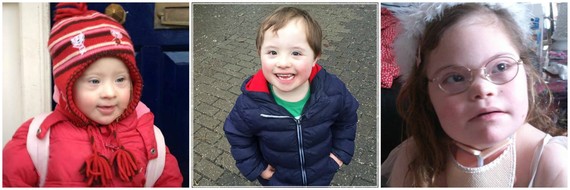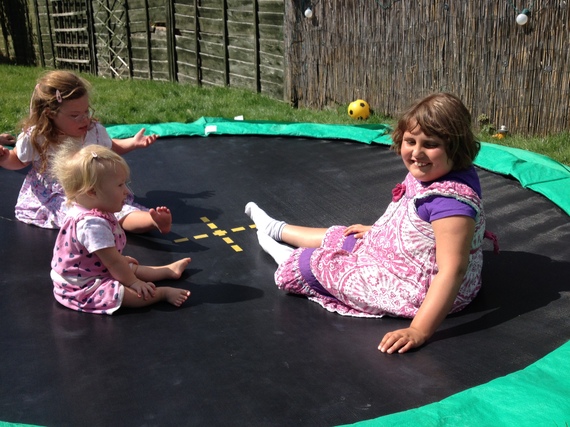In recent days I've started to feel a little uncomfortable. Guilty. Self-questioning. Not that these are new sensations for me (I went to an all girls' grammar school, after all), but this has been more than schoolgirl awkwardness. In the past two weeks, my Facebook thread has been flooded with articles, blogs and posts about the new non-invasive test for Down's Syndrome. Having been catapulted into the world of special needs almost exactly 6 years ago, I have several close friends who have children with DS, and many of them have taken an active and passionate stance against some media's one-sided portrayal of this new test as an unequivocally "good thing." Their stance is simple: since the test is now non-invasive, more women will opt to have it, which means more women will be given a "high" probability of having a child with DS, which means more women may take the decision to terminate their pregnancy. For the record, none of them are actively pro or anti-choice, nor is this in any way a blog about those debates. Their issue is misinformation which leads to life-changing (or life-ending) decisions. Their issue is that the new test may mean that effectively, we screen out DS. We eradicate "difference."
My friends, the parents of Billy and Beth and Naomi and Fred, to name only a few, are indignant and, I think, afraid. Indignant that the media have too frequently used the wrong terminology and displayed a certain degree of ignorance about DS (The Telegraph did retract its statement that DS is a "debilitating disease"); indignant that this signifies a lack of understanding of their children and the immense joy and potential they bring to the world; fear that this is the start of a slippery slope. And I completely see their point. It is scary. Should our society value children (anyone) with differences so little, that we screen them out? You don't need to have met Billy or Beth or Naomi or Fred to know the answer.
So then why am I guilty? Why self-questioning? Because amongst my newsfeed and my friends vehemently defending their children and trying to educate the world about how incredible and valued they are, I find myself, trying to change my daughter.
Scroll through my FB page. Keep scrolling through the past five years. Take a look at my blog, at the website I started, or even just at my (second) job title. Much of my life is taken up by trying to eradicate a syndrome and to change my little girl. I have written and spoken the words 'one day the diagnosis of Rett Syndrome will be followed by the words "but don't worry, we have a cure for that"' and I myself have had early gender testing in pregnancy to determine whether or not I needed to go on to be tested for Rett (I was having a boy, so I never had to make the decisions which might have followed had it been another girl). I have effectively dedicated a lot of my spare time and half my career to eradicating "difference."
Of course, it is different (not least, obviously, because our aim is to take the syndrome out of the child, not to prevent the child existing because of the syndrome). But it is also different because Rett Syndrome IS debilitating. Hannah will not ever (unless my spare-time and half-career pursuits are fruitful) live independently or have a job or get married. As things stand, it is unlikely she will ever make it out of nappies. So far in her young life she has already followed the exact opposite trajectory to that which Billy, Beth, Naomi and Fred have followed. She has lost skills, not gained them, she has become more dependent, not less. So many of the things which my friends have objected to in the media's portrayal of DS, are actually true of Rett.
And yet, of course, Hannah is incredible. Scroll through my FB page, look on our website, read any blog, and I feel sure you will see that Hannah's place in our lives is unmistakably precious. She loves and she is loved. She laughs and she makes laugh. She is at the heart of our family and our friendships; her giggle is one of the best things in my world; she has taught me how to take nothing for granted, how to truly enjoy a moment, and how to treasure those things which are said without words. So how is this something that needs changing?
This is not a new question or struggle in my mind. Nor do I think it is mine alone. I know I am not the first 'Rett parent' to wobble about investing so much time and energy and hope into the future rather than enjoying and celebrating the little girl I have standing (or sitting) in front of me today. I don't think I am the first parent of a child with special needs to feel that it is a very thin and fragile line between the unconditional love and acceptance of the child you have, and wanting things to be different. It is a dichotomy I feel constantly, and never more so than when debates like DS screening come into the media spotlight.
My answer, I think, is something which I have spoken and written before: I love and accept my daughter unconditionally, I would happily live in Holland forever, I celebrate her exactly as she is; but the future I want to change is Hannah's, not mine. I want her to live, in both the literal sense of surviving and the poetic sense of experiencing the world in all the ways possible. I want her to wake up tomorrow morning, every morning, for another 80 years, long after I'm gone and long after she has needed me to get her dressed.
So where do I stand in this debate? I don't know. Do I, or have I ever, wished I hadn't had Hannah? No, not for a second. Would I choose to terminate a pregnancy if I knew the child had Rett Syndrome? Probably not. Do I think women should have choices? Yes. Do I think too much choice can become dangerous? Yes. Do I want Rett Syndrome to be cured, to no longer exist in our society? Yes, absolutely. Do I want to eradicate 'difference' or screen out those children who, in my limited experience, have more to teach and offer the world than most of us realise? No, absolutely not.
So where I stand is clearly in a bit of a no man's land, which of course is fine, since a) where I stand is unimportant, and b) as I said, this isn't about the debate or the highly sensitive issues which surround it. Really, I just hope that where I stand is a place where I can continue to question myself, support my friends, love my daughter, fight for tomorrow, enjoy today and treasure the Billys, Beths, Naomis, Freds and Hannahs who make our world a better place.
Related
Sign up for Peacock to stream NBCU shows.
to stream NBCU shows.

